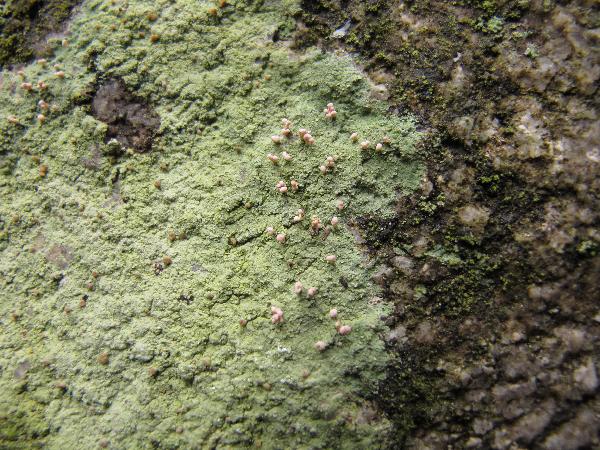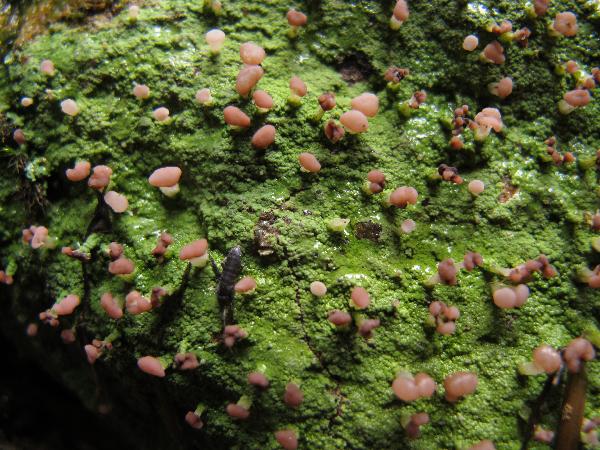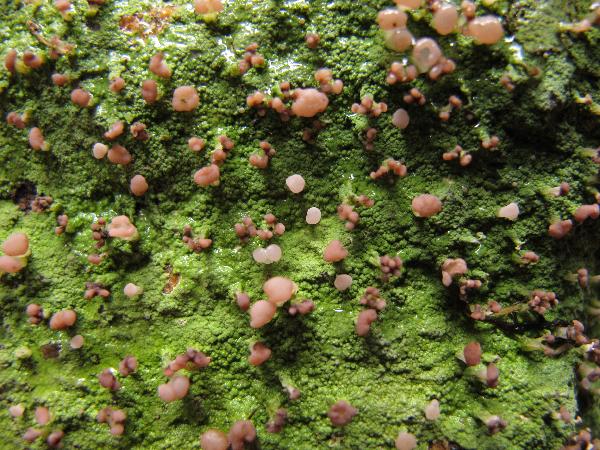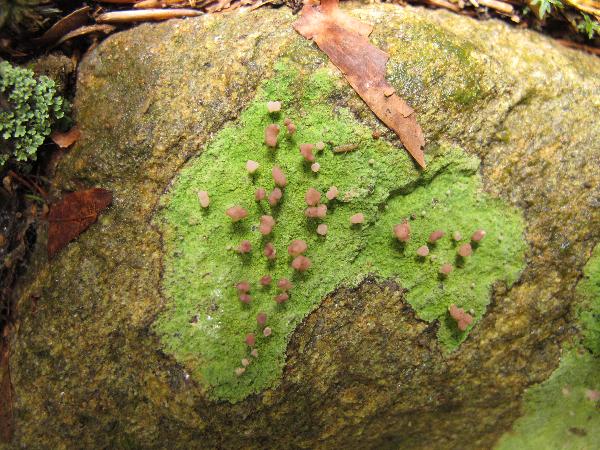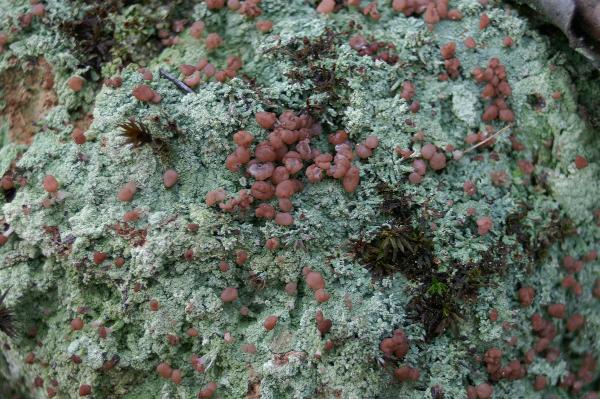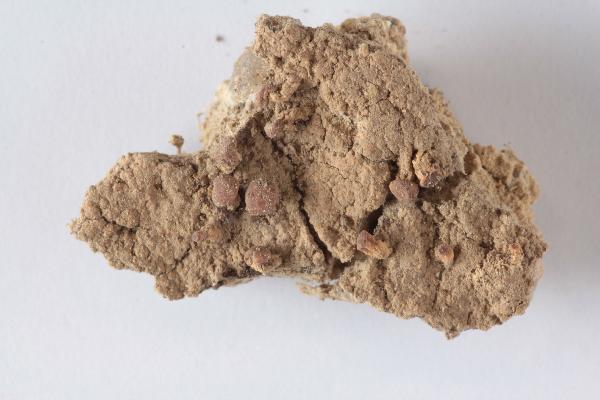Baeomyces rufus (Huds.) Rebent.
Prodr. Flor. Neomarch.: 315, 1804. Basionym: Lichen rufus Huds. - Fl. Angl.: 443, 1762.
Synonyms: Baeomyces caesiopruinosus (Anzi) Jatta?; Baeomyces rufus f. rupestris Harm.; Baeomyces rupestris Pers.; Biatora byssoides (L.) Fr.; Lichen fungiformis Scop.; Rinodina humilis H. Magn.; Rinodina humilis H. Magn.; Sphyridium byssoides (L.) Beltr.; Sphyridium fungiforme (Scop.) Flot.
Distribution: N - VG, Frl (Tretiach & Hafellner 2000), Ven (Ravera & al. 2025), TAA (Hafellner 1995, Caniglia & al. 2002, Nascimbene 2006c, Nascimbene & al. 2022), Lomb (Dalle Vedove & al. 2004), Piem (Isocrono & al. 2004, 2006, Morisi 2005), VA (Piervittori & Isocrono 1997, 1999), Emil (Benesperi 2009, Fariselli & al. 2020), Lig (Brunialti & al. 1999, Watson 2014). C - Tosc (Tretiach & Nimis 1994, Benesperi & al. 2007, Benesperi 2011, Brackel 2015), Marc (Brackel 2015), Laz (Ravera 2006), Sar. S - Camp (Garofalo & al. 1999, Aprile & al. 2003b, Catalano & al. 2016), Cal (Puntillo 1995, 1996, Brackel & Puntillo 2016).
Description: Primary thallus crustose, grey-green to greenish white, more rarely brownish, thick, continuous to areolate-subsquamulose, forming up to 20 cm wide patches, the areoles convex, contiguous, to 1 mm broad, with a warty to smooth cortex, esorediate or often powdery-sorediate, the soredia greenish grey; schizidia rare, sparse, 0.2-0.3 mm across. Apothecia frequent, biatorine, emarginate, with a red-brown, flat to convex, marginally often in-rolled disc, up to 2.5 mm across, single or coalescing, rarely sessile, usually brought on erect, fruticose, smooth, flattened to subcylindrical, often longitudinally fissured, ecorticate or basally corticate, white stipes which are 2-6(-9) mm tall. Epithecium brownish, C+ red; hymenium colourless, 75-130 µm high, K/I-; paraphyses simple to sparingly branched in upper part, slender, (1-)1.5-2 µm thick, the apical cell only slightly wider; hypothecium pale. Asci 8-spored, cylindrical, thin-walled, the apex truncated, with a single functional wall layer, with a poorly differentiated, non-amyloid tholus. Ascospores 1(-2)-celled, hyaline, fusiform, (7.5-)8-12(-14) x (2.5-)3-4(-5) µm. Pycnidia rare. Conidia bacilliform, 4-5 x c. 1 µm. Photobiont chlorococcoid. Spot tests: thallus K+ yellow, C-, KC+ yellow, P+ orange-yellow, UV+ pale yellow; mature apothecia C+ red. Chemistry: thallus with stictic acid (major), norstictic acid and an unidentified substance (traces); mature apothecia with gyrophoric and lecanoric acids. Note: a holarctic early coloniser of acid soils with high clay content, also found on weathered siliceous rocks, often in rather disturbed sites such as along mountain trails, also within forests; the species is mostly sterile in upland areas.
Growth form: Crustose
Substrata: rocks, soil, terricolous mosses, and plant debris
Photobiont: green algae other than Trentepohlia
Reproductive strategy: mainly sexual
Pioneer species
Commonnes-rarity: (info)
Alpine belt: rather rare
Subalpine belt: rather common
Oromediterranean belt: rare
Montane belt: rather rare
Submediterranean belt: rare
Padanian area: absent
Humid submediterranean belt: rather rare
Humid mediterranean belt: very rare
Dry mediterranean belt: absent

Predictive model
Herbarium samples


P.L. Nimis; Owner: Department of Life Sciences, University of Trieste
Herbarium: TSB (14271)
2001/12/09


P.L. Nimis; Owner: Department of Life Sciences, University of Trieste
Herbarium: TSB (14271)
2001/12/09


P.L. Nimis; Owner: Department of Life Sciences, University of Trieste
Italy, Friuli Venezia Giulia, Udine, Passo del Pura, Ampezzo Carnico, 1400 m
09.09.2016


Felix Schumm – CC BY-SA 4.0
[6983], Germany, Baden-Württemberg, Kreis Göppingen, Marbachtal bei Zell-Börtlingen, auf Sandboden in Bachnähe, luftfeucht, lichtoffen, ca. 350 m, TK 7223. Leg. Schumm & Schwarz 24.04.2000, det. Schumm 2000


Felix Schumm – CC BY-SA 4.0
[6983], Germany, Baden-Württemberg, Kreis Göppingen, Marbachtal bei Zell-Börtlingen, auf Sandboden in Bachnähe, luftfeucht, lichtoffen, ca. 350 m, TK 7223. Leg. Schumm & Schwarz 24.04.2000, det. Schumm 2000


Felix Schumm – CC BY-SA 4.0
[6983], Germany, Baden-Württemberg, Kreis Göppingen, Marbachtal bei Zell-Börtlingen, auf Sandboden in Bachnähe, luftfeucht, lichtoffen, ca. 350 m, TK 7223. Leg. Schumm & Schwarz 24.04.2000, det. Schumm 2000


Felix Schumm – CC BY-SA 4.0
[6983], Germany, Baden-Württemberg, Kreis Göppingen, Marbachtal bei Zell-Börtlingen, auf Sandboden in Bachnähe, luftfeucht, lichtoffen, ca. 350 m, TK 7223. Leg. Schumm & Schwarz 24.04.2000, det. Schumm 2000


Felix Schumm – CC BY-SA 4.0
[6983], Germany, Baden-Württemberg, Kreis Göppingen, Marbachtal bei Zell-Börtlingen, auf Sandboden in Bachnähe, luftfeucht, lichtoffen, ca. 350 m, TK 7223. Leg. Schumm & Schwarz 24.04.2000, det. Schumm 2000


Felix Schumm – CC BY-SA 4.0
[6983], Germany, Baden-Württemberg, Kreis Göppingen, Marbachtal bei Zell-Börtlingen, auf Sandboden in Bachnähe, luftfeucht, lichtoffen, ca. 350 m, TK 7223. Leg. Schumm & Schwarz 24.04.2000, det. Schumm 2000


Felix Schumm – CC BY-SA 4.0
[6983], Germany, Baden-Württemberg, Kreis Göppingen, Marbachtal bei Zell-Börtlingen, auf Sandboden in Bachnähe, luftfeucht, lichtoffen, ca. 350 m, TK 7223. Leg. Schumm & Schwarz 24.04.2000, det. Schumm 2000


Felix Schumm – CC BY-SA 4.0
[6983], Germany, Baden-Württemberg, Kreis Göppingen, Marbachtal bei Zell-Börtlingen, auf Sandboden in Bachnähe, luftfeucht, lichtoffen, ca. 350 m, TK 7223. Leg. Schumm & Schwarz 24.04.2000, det. Schumm 2000


Felix Schumm – CC BY-SA 4.0
[6983], Germany, Baden-Württemberg, Kreis Göppingen, Marbachtal bei Zell-Börtlingen, auf Sandboden in Bachnähe, luftfeucht, lichtoffen, ca. 350 m, TK 7223. Leg. Schumm & Schwarz 24.04.2000, det. Schumm 2000


Felix Schumm – CC BY-SA 4.0
[6983], Germany, Baden-Württemberg, Kreis Göppingen, Marbachtal bei Zell-Börtlingen, auf Sandboden in Bachnähe, luftfeucht, lichtoffen, ca. 350 m, TK 7223. Leg. Schumm & Schwarz 24.04.2000, det. Schumm 2000

Courtesy: Olivier et Danièle Gonnet - Source: https://www.afl-lichenologie.fr/Photos_AFL/Photos_AFL_B/Baeomyces_rufus.htm
France, Pollionnay, sentier forestier - Rhône
6/1/2018

Courtesy: Olivier et Danièle Gonnet - Source: https://www.afl-lichenologie.fr/Photos_AFL/Photos_AFL_B/Baeomyces_rufus.htm
France, Pollionnay, sentier forestier - Rhône
6/1/2018

Courtesy: Olivier et Danièle Gonnet - Source: https://www.afl-lichenologie.fr/Photos_AFL/Photos_AFL_B/Baeomyces_rufus.htm
France, Pollionnay, sentier forestier - Rhône
6/1/2018

Bernard Bouffinier - Source: http://www.lichensmaritimes.org/index.php?task=fiche&lichen=129&lang=en
France, Forêt du Cranou

Bernard Bouffinier - Source: http://www.lichensmaritimes.org/index.php?task=fiche&lichen=129&lang=en
France, Forêt du Cranou

Bernard Bouffinier - Source: http://www.lichensmaritimes.org/index.php?task=fiche&lichen=129&lang=en
France, Forêt du Cranou

Jacques Haine - Source: http://www.lichensmaritimes.org/index.php?task=fiche&lichen=129&lang=en
France, Monthermé

Jacques Haine - Source: http://www.lichensmaritimes.org/index.php?task=fiche&lichen=129&lang=en
France, Ardennes

Jacques Haine - Source: http://www.lichensmaritimes.org/index.php?task=fiche&lichen=129&lang=en
France, Ardennes

Jacques Haine - Source: http://www.lichensmaritimes.org/index.php?task=fiche&lichen=129&lang=en
France, Ardennes

Ulrich Kirschbaum CC BY-SA 4.0 - Source: https://www.thm.de/lse/ulrich-kirschbaum/flechtenbilder
Central Europe; Germany; Bavaria: Allgäu.

Ulrich Kirschbaum CC BY-SA 4.0 - Source: https://www.thm.de/lse/ulrich-kirschbaum/flechtenbilder
Central Europe; Germany; Bavaria: Allgäu.
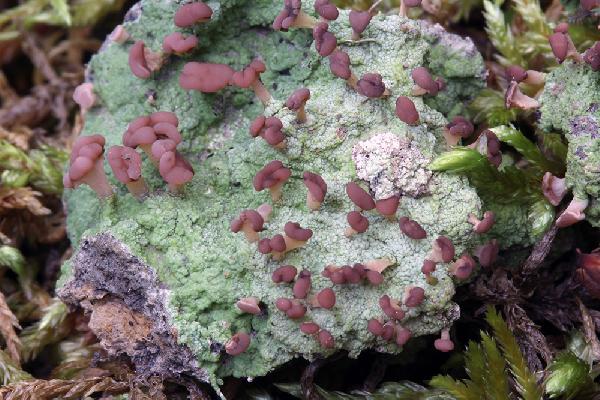
Marta González Garcia - Centro de Estudios Micologicos Asturianos
La Corredoria, (Pola de Laviana-Asturias), 12-IX-2017, en un talud sombrío.
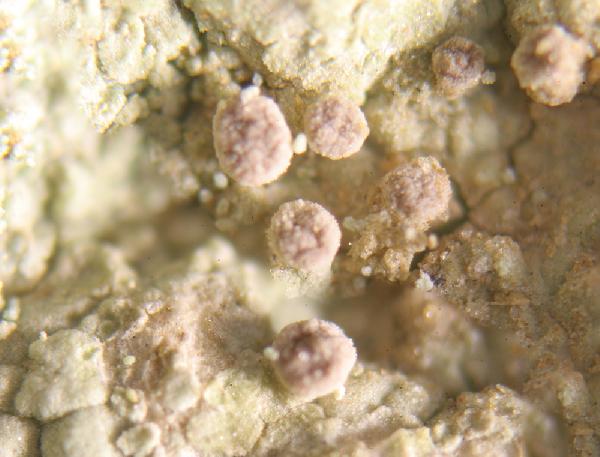
Marta González Garcia - Centro de Estudios Micologicos Asturianos
La Corredoria, (Pola de Laviana-Asturias), 12-IX-2017, en un talud sombrío.
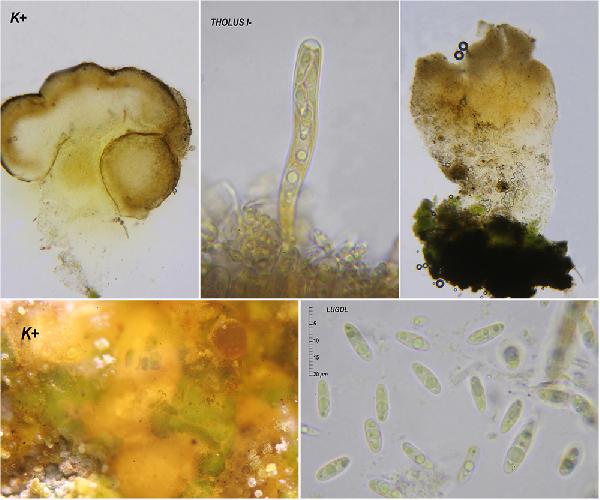
Marta González Garcia - Centro de Estudios Micologicos Asturianos
La Corredoria, (Pola de Laviana-Asturias), 12-IX-2017, en un talud sombrío.
Growth form: Crustose
Substrata: rocks, soil, terricolous mosses, and plant debris
Photobiont: green algae other than Trentepohlia
Reproductive strategy: mainly sexual
Pioneer species
Commonnes-rarity: (info)
Alpine belt: rather rare
Subalpine belt: rather common
Oromediterranean belt: rare
Montane belt: rather rare
Submediterranean belt: rare
Padanian area: absent
Humid submediterranean belt: rather rare
Humid mediterranean belt: very rare
Dry mediterranean belt: absent

Predictive model
| Herbarium samples |


P.L. Nimis; Owner: Department of Life Sciences, University of Trieste
Herbarium: TSB (14271)
2001/12/09


P.L. Nimis; Owner: Department of Life Sciences, University of Trieste
Herbarium: TSB (14271)
2001/12/09


P.L. Nimis; Owner: Department of Life Sciences, University of Trieste
Italy, Friuli Venezia Giulia, Udine, Passo del Pura, Ampezzo Carnico, 1400 m
09.09.2016


Felix Schumm – CC BY-SA 4.0
[6983], Germany, Baden-Württemberg, Kreis Göppingen, Marbachtal bei Zell-Börtlingen, auf Sandboden in Bachnähe, luftfeucht, lichtoffen, ca. 350 m, TK 7223. Leg. Schumm & Schwarz 24.04.2000, det. Schumm 2000


Felix Schumm – CC BY-SA 4.0
[6983], Germany, Baden-Württemberg, Kreis Göppingen, Marbachtal bei Zell-Börtlingen, auf Sandboden in Bachnähe, luftfeucht, lichtoffen, ca. 350 m, TK 7223. Leg. Schumm & Schwarz 24.04.2000, det. Schumm 2000


Felix Schumm – CC BY-SA 4.0
[6983], Germany, Baden-Württemberg, Kreis Göppingen, Marbachtal bei Zell-Börtlingen, auf Sandboden in Bachnähe, luftfeucht, lichtoffen, ca. 350 m, TK 7223. Leg. Schumm & Schwarz 24.04.2000, det. Schumm 2000


Felix Schumm – CC BY-SA 4.0
[6983], Germany, Baden-Württemberg, Kreis Göppingen, Marbachtal bei Zell-Börtlingen, auf Sandboden in Bachnähe, luftfeucht, lichtoffen, ca. 350 m, TK 7223. Leg. Schumm & Schwarz 24.04.2000, det. Schumm 2000


Felix Schumm – CC BY-SA 4.0
[6983], Germany, Baden-Württemberg, Kreis Göppingen, Marbachtal bei Zell-Börtlingen, auf Sandboden in Bachnähe, luftfeucht, lichtoffen, ca. 350 m, TK 7223. Leg. Schumm & Schwarz 24.04.2000, det. Schumm 2000


Felix Schumm – CC BY-SA 4.0
[6983], Germany, Baden-Württemberg, Kreis Göppingen, Marbachtal bei Zell-Börtlingen, auf Sandboden in Bachnähe, luftfeucht, lichtoffen, ca. 350 m, TK 7223. Leg. Schumm & Schwarz 24.04.2000, det. Schumm 2000


Felix Schumm – CC BY-SA 4.0
[6983], Germany, Baden-Württemberg, Kreis Göppingen, Marbachtal bei Zell-Börtlingen, auf Sandboden in Bachnähe, luftfeucht, lichtoffen, ca. 350 m, TK 7223. Leg. Schumm & Schwarz 24.04.2000, det. Schumm 2000


Felix Schumm – CC BY-SA 4.0
[6983], Germany, Baden-Württemberg, Kreis Göppingen, Marbachtal bei Zell-Börtlingen, auf Sandboden in Bachnähe, luftfeucht, lichtoffen, ca. 350 m, TK 7223. Leg. Schumm & Schwarz 24.04.2000, det. Schumm 2000


Felix Schumm – CC BY-SA 4.0
[6983], Germany, Baden-Württemberg, Kreis Göppingen, Marbachtal bei Zell-Börtlingen, auf Sandboden in Bachnähe, luftfeucht, lichtoffen, ca. 350 m, TK 7223. Leg. Schumm & Schwarz 24.04.2000, det. Schumm 2000


Felix Schumm – CC BY-SA 4.0
[6983], Germany, Baden-Württemberg, Kreis Göppingen, Marbachtal bei Zell-Börtlingen, auf Sandboden in Bachnähe, luftfeucht, lichtoffen, ca. 350 m, TK 7223. Leg. Schumm & Schwarz 24.04.2000, det. Schumm 2000

Courtesy: Olivier et Danièle Gonnet - Source: https://www.afl-lichenologie.fr/Photos_AFL/Photos_AFL_B/Baeomyces_rufus.htm
France, Pollionnay, sentier forestier - Rhône
6/1/2018

Courtesy: Olivier et Danièle Gonnet - Source: https://www.afl-lichenologie.fr/Photos_AFL/Photos_AFL_B/Baeomyces_rufus.htm
France, Pollionnay, sentier forestier - Rhône
6/1/2018

Courtesy: Olivier et Danièle Gonnet - Source: https://www.afl-lichenologie.fr/Photos_AFL/Photos_AFL_B/Baeomyces_rufus.htm
France, Pollionnay, sentier forestier - Rhône
6/1/2018

Bernard Bouffinier - Source: http://www.lichensmaritimes.org/index.php?task=fiche&lichen=129&lang=en
France, Forêt du Cranou

Bernard Bouffinier - Source: http://www.lichensmaritimes.org/index.php?task=fiche&lichen=129&lang=en
France, Forêt du Cranou

Bernard Bouffinier - Source: http://www.lichensmaritimes.org/index.php?task=fiche&lichen=129&lang=en
France, Forêt du Cranou

Jacques Haine - Source: http://www.lichensmaritimes.org/index.php?task=fiche&lichen=129&lang=en
France, Monthermé

Jacques Haine - Source: http://www.lichensmaritimes.org/index.php?task=fiche&lichen=129&lang=en
France, Ardennes

Jacques Haine - Source: http://www.lichensmaritimes.org/index.php?task=fiche&lichen=129&lang=en
France, Ardennes

Jacques Haine - Source: http://www.lichensmaritimes.org/index.php?task=fiche&lichen=129&lang=en
France, Ardennes

Ulrich Kirschbaum CC BY-SA 4.0 - Source: https://www.thm.de/lse/ulrich-kirschbaum/flechtenbilder
Central Europe; Germany; Bavaria: Allgäu.

Ulrich Kirschbaum CC BY-SA 4.0 - Source: https://www.thm.de/lse/ulrich-kirschbaum/flechtenbilder
Central Europe; Germany; Bavaria: Allgäu.

Marta González Garcia - Centro de Estudios Micologicos Asturianos
La Corredoria, (Pola de Laviana-Asturias), 12-IX-2017, en un talud sombrío.

Marta González Garcia - Centro de Estudios Micologicos Asturianos
La Corredoria, (Pola de Laviana-Asturias), 12-IX-2017, en un talud sombrío.

 INDEX FUNGORUM
INDEX FUNGORUM
 GBIF
GBIF
 DOLICHENS
DOLICHENS




















